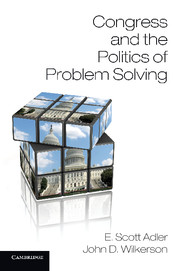Book contents
- Frontmatter
- Contents
- Tables and Figures
- Preface
- Part I
- Part II
- Part III
- Part IV
- 8 Problem Solving and Policy Focal Points
- 9 Problem Solving and the Dynamics of Policy Change
- 10 Problem Solving and American Politics
- Appendix A
- Appendix B Assignment of Bills across Issue Types
- Appendix C Calculating Committee Roll Rates
- Bibliography
- Index
8 - Problem Solving and Policy Focal Points
Published online by Cambridge University Press: 05 January 2013
- Frontmatter
- Contents
- Tables and Figures
- Preface
- Part I
- Part II
- Part III
- Part IV
- 8 Problem Solving and Policy Focal Points
- 9 Problem Solving and the Dynamics of Policy Change
- 10 Problem Solving and American Politics
- Appendix A
- Appendix B Assignment of Bills across Issue Types
- Appendix C Calculating Committee Roll Rates
- Bibliography
- Index
Summary
Nine out of ten times, we’re occupied with expiring legislation. I know that doesn’t sound very inspiring, but, frankly, that’s the truth.
A Senate committee staffer interviewed by John Kingdon (1995, 186)Policies are a legislature’s most important products. Scholars study agenda control, committee composition, voting decisions, lobbying, and many other topics because these factors are assumed to have important consequences for the policies legislatures produce (Baumgartner et al. 2009; DeGregorio 1999; Krehbiel 1991; Poole and Rosenthal 2007; Shepsle and Weingast 1987). Party polarization is a growing concern of political observers, academics, even members of Congress, because it is believed to contribute to “policy gridlock” (Brady, Ferejohn, and Harbridge 2008; Hamilton 2009; Jones 2001; McCarty 2007; Theriault 2008).
Yet, systematic studies of policy change in legislatures are surprisingly thin. Most of the studies that do exist focus on a small number of “historic” enactments that represent just a small proportion of overall legislative activity (Berry, Burden, and Howell 2010; Krehbiel 1998; Maltzman and Shipan 2008; Mayhew 1991). In the next two chapters we extend existing research on issue attention and policy change in important new ways. We focus on legislative policy action (as opposed to the many other domains where government policy is made, for example, by unilateral presidential action or bureaucratic implementation; see Dye 2010; Howell 2003; Ripley and Franklin 1990). In the realm of legislative policy making, existing perspectives emphasize macrolevel shifts in partisan or ideological preferences as the key drivers of policy change in Congress. In contrast, our problem-solving perspective highlights microlevel policy specific factors, such as program expirations and salient events, as central to appreciating policy change.
- Type
- Chapter
- Information
- Congress and the Politics of Problem Solving , pp. 143 - 166Publisher: Cambridge University PressPrint publication year: 2013

